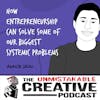Best of 2021: Ankur Jain | How Entrepreneurship Can Solve Some Of Our Biggest Systemic Problems

When Ankur Jain was 11 years old, he wanted to play in the basketball team and believed he needed a special pair of shoes to jump higher. So he coded a website, phoned the shoe company and asked to speak to the CEO. Ankur told the CEO that he would adv...
Subscribe for ad-free interviews and bonus episodes https://plus.acast.com/s/the-unmistakable-creative-podcast.
Hosted on Acast. See acast.com/privacy for more information.
Candid Conversations: Elevate Your Thinking with Masters of Their Craft
Dive into a realm of transformative conversations, where wisdom from trailblazers who've shattered norms is at your fingertips. Learn from best-selling authors who've decoded productivity, and thought leaders who've sculpted the landscape of personal and professional growth. Unearth the secrets of successful entrepreneurs, delve into the science of habits, and explore the art of charisma. Each conversation is a journey, brimming with unexpected insights and practical wisdom that will ignite you











